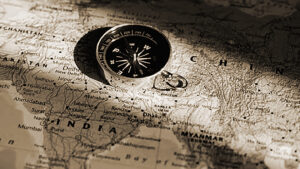August 12, 2021: There are migrant stories that you often get told about. And then there are those that are off limits – because they’re too dark, too unnerving, and too truthful to discuss at cocktail parties and social gatherings. Even a lot of mainstream migration experts won’t tell you those migrant tales.
This article is about this second type of migrant stories. It’s about how a certain section of the human race is systematically conned into signing up as modern-day ‘slaves’, even as they live (and die) in the most seemingly tranquil and financially secure part of the planet.
The location where this con act of mass slavery happens is a region that glitters with towering skyscrapers, dazzling shopping malls, high-end sports cars, beautiful desert camps, cosmopolitan populations, and lots of oil and gas rigs.
We’ve just parachuted you into the Gulf region. Located in the heart of West Asia (which is referred to as Middle East by the Western world), the Gulf – for all its petrodollar fairytales – is not a hunky-dory oasis for a vast section of the expatriate population that lands up there. For many, the red deserts of West Asia are literally a quicksand.
The Rot Under The Shine
For a certain unfortunate category of expat people in the six Gulf countries, the Arab world’s glitter is only a misleading gift-wrapper deceptively holding together a maggot-infested rot bursting at the seams.
We’re talking about an estimated 3-to-5 million low-income Bangladeshi migrants entrapped in the six sheikhdoms of the Gulf – Saudi Arabia, the UAE (United Arab Emirates), Kuwait, Qatar, Bahrain, and Oman.
Bangladesh’s migrant population is shackled to the Gulf’s desert rose via an unforgiving employment trap known infamously as the ‘kafala system’. It’s a system where you sign up to a lopsided slave-master relationship instead of a rights-based employee-recruiter model.
It’s true that the infamous kafala system is somewhat discussed, but only sparingly. The darkest and deepest stories resulting from this modern-day slavery pipeline don’t make it to the mainstream headlines. The so-called evolved West’s and the United Nations’ perpetual and assured support for the kafala system is also hardly scrutinised.
So, who are these few million Bangladeshis we are talking about? What do we know about them?
Born Into Poverty
They are mostly young men who are school dropouts and desperate job-seekers, hailing from the most impoverished parts of Bangladesh’s largely poor hinterland. A very small minority of this Gulf-bound ‘human traffic’ hails from cities such as Dhaka and Chittagong.
The majority is from the poorest of the poor villages. Empire Diaries has had deep interactions with multiple Bangladeshi slaves in the Gulf region. Most of them told us that they haven’t even seen the cities of their own country; many of them haven’t visited Dhaka!
So, going to the Gulf world is a massive aspirational dream for them. And therefore, they are easy targets of the slavery system as they get ensnared to climb onto the Gulf’s conveyor belt of bonded labourers without suspecting a thing.
It’s important to note that there’s a minor section of Bangladeshi migrants in the Gulf kingdoms who are highly-skilled, highly educated and are into super-specialisation jobs in the posh cities of the Arab world. Some of them are quite well established and there are several self-made entrepreneurs, too.
But this article is not about that minor section that deservedly lives a hard-earned good life in the desert oasis. It’s about the majority section of Bangladeshi migrants that faces exploitative labour practices.
So, how do these ‘slaves’ end up in the Gulf?
In their desperation to wriggle of poverty, they leave their native places and land up in the oil kingdoms for a change of fortunes. What do they do in the Gulf for a living?
They’re mostly hired as ‘gardeners’ and ‘helpers of gardeners’. We’re not talking about idyllic rose-and-jasmine gardens here. The Bangladeshi migrants are hired to man, curate, and maintain sprawling and cruel tracts of date-palm (‘khajoor’) farmland. They manage them through scorching summers when the mercury routinely touches the 50-degree Celsius mark.
Interestingly, the ministries in the Gulf kingdoms don’t officially declare it when the temperatures soar past 50C, because if that’s made official, then they would be required to call upon the owners of the slaves to pause outdoor work of the migrant population.
The next big chunk of employment happens in the form of construction labourers for industrial and residential building projects, and also at the oil and gas refineries (although the oil and gas operations involve a high proportion of Indian slave-like labourers).
Also, the Bangladeshis are roped in as cleaners, janitors, cooks, waiters, drivers, loaders, watchmen, painters, car mechanics, barbers, tailors, delivery boys, and caretakers. Most of them get sucked into working in open farms, oil and gas facilities, garages, construction sites, back-offices, factories, outdoor coffee shops, shopping centres, departmental stores, neighbourhood mom-and-pop shops, and food courts at giant shopping malls.
Many others get hired to work as ‘hands’ at large family homes in the villages, basically ending up playing multitasking roles – from keeping the villas clean, to cooking, to looking after the gardens and the farmland.
Here’s a shocking factoid, something that Empire Diaries discovered in the course of our multiple candid discussions with numerous Bangladeshi ‘slaves’ in Oman and Saudi Arabia. There is an unreported trend in some of the villages of the Gulf region, where young Bangladeshi labourers – while their passports are taken away by their owners – are forced to double up as so-called ‘toy boys’ for the rural womenfolk.
The DNA Of Slavery
So, do the lifestyles of these Bangladeshi migrants improve when they move to the Gulf? That’s only a mirage. Here’s what they have to put up with after landing up in the land of false promises: they get profiled, bullied, herded, humiliated, tortured, ridiculed, misused, abused, heckled, bad-mouthed, sleep-deprived, misunderstood, and in many cases, physically assaulted.
In a few three words, they’re underfed, underpaid, overworked, and abused.
This, in a nutshell, is the life and times of the average low-income Bangladeshi migrant in the Gulf sheikhdoms, barring very few exceptions. The exceptions – instances of low-paid Bangladeshis living a good life in the Gulf – is a drop in the ocean.
The jobs these ‘slaves’ are into do fetch salaries or wages, but the income comes with strings attached. There’s a shocking work-life imbalance. There are no humane work shifts. Those working on date farms have to get off their cots at four in the morning. When the day’s work is done, it’s well past sundown. Even if there’s time to cook a modest meal before crashing into their cots, they’re too exhausted to stay up for that – as Empire Diaries has witnessed from close quarters.
It’s the same plight across the board. No weekly offs. They have to perpetually wear plastic smiles on their faces and slog it out throughout the year, only to get a rare off-day or two on the two Eid holidays. Their work cycle runs like clockwork, seven days a week, 30 days a month, 365 days a year.
Their living conditions go well with their pitiful work life. They are given basic outhouses to reside in, which are skeletal tin-and-brick huts unsuitable for West Asia’s harsh summers. In the cities of the Gulf, oftentimes they are given low-ceiling garage-like spaces to live in that are rundown, suffocating, and congested.
In many cases, they are crammed into squalid little rooms, with bed bugs and dilapidated air conditioners for company. The ACs work, yes. And that’s only to make sure the dirt-cheap labour doesn’t die out completely.
If the heat wipes them out, who will keep the famed Gulf kingdoms clean and glittering?
Masters Of The ‘Slaves’
Let’s now talk about the migrant slaves’ bosses or owners, also called the ‘sponsors’ – a clever and sanitised word used by the labour ministries and the West Asian mainstream media. In Arabic language, they are called ‘arbabs’. Sheikh or no sheikh by title, they ensure their relationship with the migrant recruits is that of the centuries-old master-slave system.
Once the Bangladeshis land up at their destination airport in the Gulf, the first thing that they experience is their owners or ‘sponsors’ receiving them and instantly taking possession of their passports. It’s a pre-emptive action to the newly arrived slaves stay chained to them.
The good thing is that in recent years across the Persian Gulf, most corporate entities and government bodies have stopped the practice of withholding the passports of expat employees. But when it comes to Bangladeshi migrants, most slave owners at the individual level continue to do it.
It’s a gross violation of human rights no-one talks about – be it the Western governments, the Western press, the various UN bodies, Amnesty International, and Human Rights Watch, Greenpeace. Even the Bangladeshi government and the Bangladeshi press have never turned this humongous crisis into a perpetual cause to pursue.
By taking the migrants’ passports away from them, the ‘arbabs’ also ensure that their under-pressure slaves don’t wander off to other jobs or get poached by competitors.
In the Gulf, you can switch jobs only if your employer or owner let’s you go by releasing your passport with a signed undertaking of your release – something like an NOC (no-objection certificate).
This rigid and notorious ‘kafala’ system shuts out the scope for healthy poaching, and with that, it chains the migrant to his master for good.
Can’t Run, Can’t Hide
An estranged Bangladeshi migrant in West Asia in can’t just wake up one fine morning, dash off to the airport, and board a flight back home. He’s not in possession of his passport. He has to wait for a year, or two, or three, for his owner to release his passport so that he can go visit his native land – and then eventually decide not to return to slavery.
But here’s an unfortunate catch. The families of these workers are so financially starved that despite the temptation to tear up their Gulf work visas once they’re back home in Bangladesh, the migrants reluctantly head back to the desert after the vacation – only for the sake of keeping the overseas livelihood route open.
Bangladeshi migrants are also exposed to heartlessly punitive actions during their slavery spells in West Asia. Empire Diaries is aware of unimaginable instances that are stranger than fiction. The cities and towns of the Gulf are full of little outdoor coffee shops selling beverages and Arabic snacks. More than 90% of them are manned by Bangladeshi ‘slaves’, most of whom are not in possession of their passport.
At these coffee shops, the Bangladeshi waiters are not allowed to receive tips voluntarily offered by customers. At such coffee shops, the owners keep a close watch on the waiters via footage from CCTV cameras.
If the waiters are found to be accepting tips or chatting up too much with the customers or receiving their friends who drop by to say hello, they get severely penalised. Either they pay a penalty on their next salary, or in some cases, they get sacked and bundled off on a flight back to Bangladesh – albeit without their existing savings and due payments.
Secret Lives Not Allowed
Empire Diaries was in close touch with a Bangladeshi slave in Muscat, Oman’s capital, who used to work as a head waiter at an outdoor coffee shop owned by an Omani family. The young bachelor from Cox’s Bazaar was sacked and bundled off overnight when his ‘sponsor’ or ‘arbab’ discovered one day that he was secretly learning to drive a car! The owner feared that upon learning to drive, the youngster would someday want to leave the job of a waiter. Therefore, he took immediate action to end his stay in Muscat.
While you wonder why Bangladeshi youngsters repeatedly end up in the Gulf trap, it’s primarily because a deceptive recruitment (read: entrapment) channel is firmly in place, which is insulated from government or police crackdown.
Disillusioned by the hopelessness of their broken lives in Bangladesh’s villages, and charmed by the distant glitz and Islamic orientation of the Gulf kingdoms, young aspirants fall easy prey to ‘dalaals’ or agents on the prowl across the country’s heartland scouting for cheap labour.
These opportunistic agents are mostly Bangladeshi nationals with job-market connections in the Gulf countries. Whenever they come across prospective candidates in Bangladesh’s hinterland through hyperlocal sub-agents, they pounce on them.
Selling Pipe Dreams
Intoxicating Arab-world pipe dreams are used as a bait. The rural youngsters are lulled by misleading job offers – respectable work positions at glitzy malls or at well-maintained hospitals or in luxury hotels or with high-end car showrooms or as drivers at multinational companies or as helping hands in wealthy Arab bungalows.
The agents in Bangladesh, who are fully aware of the perils of the slavery system, motivate these youngsters to coax their poor families to put together the money required to ‘book’ a job in the Gulf.
On average, this booking amount comes to three-to-five lakh Bangladeshi takas per head.
It’s an astronomical sum of money for a poor rural family in Bangladesh’s hinterland. In many cases, the womenfolk sell off ancestral jewellery, the men sell off farmland and cattle, and entire families wade neck-deep into informal debt to finance their kids’ dream elevation to life in a Gulf kingdom.
The hefty booking money includes fees for local and domestic agents; fees for the Gulf-based agency that facilitates the immigration process; payments for humiliating full-body medical check-ups at Gulf-authorised test centres in Bangladesh and again at a check-up centre in the final destination (in both cases, the candidates are disrespectfully probed and blood-tested); payment for visa and flight ticket; and additional charges to be paid to the eventual recruiter.
The Disillusionment
For many young Bangladeshi migrants, the illusion wears off the moment they’re handed over to their owners or sponsors upon arrival in the Gulf.
A series of jolts hit them live tidal waves.
Jolt one, the receiving agency claims (usually deceitfully) that it’s not been paid, and it tries to extricate that amount from the newly arrived migrant. Obviously, the migrant is caught unawares and is unable to pay up the money immediately. He feels cheated, and he has no option but to promise to pay the fee in instalments from the meagre wages he’ll earn from his new job.
Jolt two, the sponsor does what he does best upon taking ‘possession’ of his slave – snatch passport away. That’s the moment the slave-master relationship gets sealed.
Jolt three, the jobs that are hurled at them, the wages or salaries they’re told they’ll earn, and the woeful places they’re thrown into for residing don’t match at all with what they were initially promised by the agents back in Bangladesh.
Jolt four – and that’s the worst one – is the realisation that there’s no turning back. Simply because the migrant has to now earn money for years on end in the Gulf in order to be able to pay off the debts shouldered by his family back in Bangladesh to bankroll this Gulf trip. Plus, he has to pay the so-called unpaid fees of the receiving agent and/or the recruiter.
They’re Not Invisible
Interestingly, for people residing in the Gulf states, it’s not difficult to spot this sizeable population of enslaved Bangladeshis.
They can be seen at shops, fuel pumps, low-end eateries, garages, back-offices, often cleaning cars at parking lots, running chores in traditional family homes, serving as caretakers and date-farm gardeners in the villages, and working as drivers.
If you drive across the length and breadth of each of the six Gulf countries, you will sometimes bump into what are locally called ‘labour camps’ tucked away between dunes, rocky hills, and desert shrubs.
Underpaid Bangladeshis who work in factories, workshops and major infra project sites are the ones who reside in these labour camps, where buses arrive at daybreak to ferry them to their workplaces, and drop them back in the evening.
When the migrants die from accidents at their worksites, the episodes are hushed up, and the bodies are quietly bundled off to their hometown in Bangladesh. There’s no system in place to seek redressal, compensation, or investigation. The Omani-owned slave-recruiting companies, often manned by a pool of well-paid Indian and Western managers, are insulated from any kind of action when their slaves die while working for them – be it from dehydration at open-air workplaces or accidental fall from tall construction sites.
Gulf Of Hypocrisy
The sheikhs and sheikhdoms of the Gulf are known for their opulence, and also their love for Islam and so-called Islamic values. Yet, when it comes to their twisted philosophy of treating the Bangladeshi migrant population, things don’t add up.
Neither the opulence of the upper classes trickles down to the slaves, nor do the so-called fierce defenders of Islam give dignified treatment to the Bangladeshis for the sake of Islamic brotherhood. Yet, the Gulf countries are quietly serviced by the Bangladeshi migrant population.
Truth indeed appears stranger than fiction if one digs deep into how unapologetically the Gulf kingdoms run this darkest slavery system in modern history.
(The writer has lived in West Asia. Observations are based on multiple first-hand experiences and interactions. Names of the migrants interviewed have been withheld for their safety.)
COPYRIGHT & REPUBLISHING TERMS:
All rights to this content are reserved with Empire Diaries. If you want to republish this content in any form, in part or in full, please contact us at writetoempirediaries@gmail.com.








